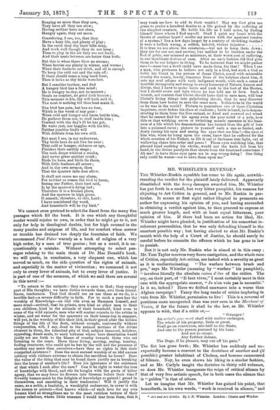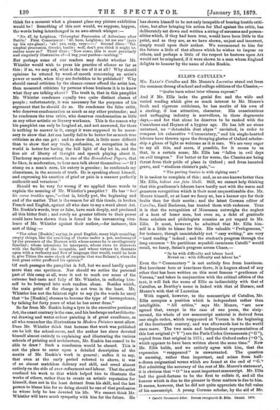MR. WHISTLER'S REVENGE.*
TIIE Whistler-Ruskin squabble has come to life again, notwith- standing the verdict for the plaintiff lately delivered. Apparently dissatisfied with the heavy damages awarded him, Mr. Whistler has put forth in a small, but very bitter pamphlet, his reasons for objecting to Art Critics in general, and to Mr. Ruskin in par- ticular. It seems at first sight rather illogical to prosecute an author for expressing. his opinion of you, and having succeeded in obtaining a verdict against him, to then proceed to express at much greater length, and with at least equal bitterness, your opinion of him. If there had been no action for libel, Mr. Whistler might have pleaded, in justification of his somewhat in- coherent personalities, that he was only defending himself in the smartest possible way ; but having elected to shut Mr. Ruskin's mouth with the help of a Court of Justice, he should surely be careful before he commits the offence which he has gone to law to punish.
But it is not only Mr. Ruskin who is aimed at in this essay ; Mr. Tom Taylor receives very fierce castigation, and the whole race of Critics, especially Art-critics, are lashed with a severity as great as it is undiscriminating. "The warfare between brush and pen," says Mr. Whistler (meaning by " warfare " his pamphlet), "involves literally the absolute raison d etre of the critics. The cry, on their part, of "11 faut vivre," I must certainly meet in this case with the appropriate answer, " Je n'en vois pas la necessite." Is it so, indeed ? Have we drifted unawares into a worse than Afghan campaign ? Fancy the long ranks of critics imploring in vain from Mr. Whistler, permission to live This is a reversal of positions more unexpected than was ever seen in the Merchant of Venice, if for the future it shall be the law, as Mr. Whistler
appears to wish, that if a critic or,—
" Stranger !
An artist's poor work shall with malice endanger, The whole of his property, little or great, Shall go on conviction, one-half to the State, And one to the person pursued by his hate.
And not to create Any farther debate,
The Doge, if he pleases, may cut off his pate."
The fiat has gone forth ; Mr. Whistler has suddenly and mm- expectedly become a convert to the doctrines of another and (if possible) greater inhabitant of Chelsea, and beoome enamoured of Silence. Nay, he even shows his liking in a similar fashion, and as Mr. Carlyle taught the doctrine in thirty odd volumes, so does Mr. Whistler inaugurate the reign of critical silence by that of very free artistic speech, for in both cases the silence that is "golden" is that of others.
Let us imagine that Mr. Whistler has gained his point, that henceforth, in his own words, "work is received in silence," and
* Art and Art Critics. By J. N. Whistler. London ; Chatto and Windua.
think for a moment what a pleasant place any picture exhibition would be ! Something of this sort would, we suppose, happen, the words being interchanged in an awe-struck whisper :—
"No. 47, by Leighton, Triumphal Procession of Athenians after Battle.' First Connoisseur : '47, ham, Leighton ; let me see' (puts up his eye-glass); 'eh! yes, very, very.—: Second ditto : Tri- umphal procession, Greeks, battle ; well, don't you think it might be, rather more so ?' Third ditto : 'Now come, this is most peculiarly and singularly illustrative of—I beg your pardon—nothing."
But perhaps some of our readers may doubt whether Mr. Whistler would wish to press his practice of silence so far as this ; if so, we may ask, what is the use of it at all ? Why should opinions be uttered by word-of-mouth concerning an artist's power or merit, when they are forbidden to be published? Why ehould casual criticism by the chance-comer offend the artist less, than measured criticism by persons whose business it is to know what they are talking about ? The truth is, that in this pamphlet Mr. Whistler condemns equally two quite distinct classes of people ; unfortunately, it was necessary for the purposes of his
argument that he should do so. He condemns the false critic, who deserves condemnation as much as any other pretender; and he condemns the true critic, who deserves condemnation as little as any other artistic or literary workman. This is the reason why his pamphlet can only be laughed at, and not answered, for there is nothing to answer in it, except it were supposed to be neces-
sary to show that Art can hardly fail to be better for as much true criticism as she can get ; and to show that, is little more difficult than to show that any trade, profession, or occupation in the world is better for having the full light of day let in, and the free air of liberty of thought and speech playing about it. Thackeray says somewhere, in one of the Roundabout Papers, that he likes, in moderation, to hear men talk about themselves :—"If I stamp on a man's corn, his outcry is genuine ; he confounds my clumsiness, in the accents of truth. He is speaking about himself, and expressing his emotion of grief or pain in a manner perfectly authentic and veracious."
Should we be very far wrong if we applied these words to explain the meaning of Mr. Whistler's pamphlet ? He has "had his corns trodden upon,"—that is, briefly put, the beginning and
end of the matter. That is the reason for all this tirade, in broken French and English, against all who dare to say a word about Art.
Mr. Ruskin's words, true or false, have sunk deeply, and produced all this bitter fruit ; and surely no greater tribute to their power could have been shown than is found in the unreasoning viru- lence of Mr. Whistler against their author,—for instance, this sort of thing :—
"The other [Ruskin] saying, in good English, many high-sounding, empty things, like the crackling of thorns under a pot, undismayed by the presence of the Masters with whose names he is sacrilegiously familiar ; whose intentions he interprets, whose vices he discovers with the facility of the incapable, and whose virtues he descants upon with a verbosity and flow of language that would, could he hear it, give Titian the same shock of surprise that was Balaam's, when the first great critic proffered his opinion."
Of such passages the pamphlet is full, but we need hardly quote more than one specimen. Nor should we notice the personal part of this essay at all, were it not to mark our sense of the extreme bad-taste and folly of Mr. Whistler, in suffering him- self to be betrayed into such random abuse. Besides which, the main point of the charge is not true in the least. Mr. Whistler has not the faintest right to say (in the words he uses) that "he [Ruskin] chooses to become the type of incompetence, by talking for forty years of what he has never done."
So far from Mr. Ruskin being a tyro in the executive portion of Art, the exact contrary is the case, and his landscape and architectu- ral drawing and water-colour painting is of great excellence, as all who remember the illustrations to Modern Painters must allow. Does Mr. Whistler think that because that work was published ere he left the school-room, and the author has since devoted himself almost entirely to explaining and illustrating the various schools of painting and architecture, Mr. Ruskin has ceased to be able to draw ? Such a conclusion would be absurd. This is mot the place to enter upon a detailed description of the merits of Mr. Ruskin's work in general ; suffice it to say, that even at the early period referred to above, it was of an almost matchless delicacy and skill, and erred almost entirely on the side of over-refinement and labour. That the artist confined his work to that which helped him to illustrate the works of others, rather than to create an artistic reputation for himself, does not in the least detract from his skill, and the last person to blame him for so doing should be one of that profession to whose help he has devoted his life. We cannot think Mr.
Whistler will have much sympathy with him for the future. He has shown himself to be not only incapable of bearing hostile criti- cism, but after bringing his action for libel against the critic, has deliberately sat down and written a string of sarcasms and person- alities which, if they had been true, would have been little to the point, and as they are, as we have shown, unjust and incorrect, simply recoil upon their author. We recommend to him for the future a little of that silence which he wishes to impose on others, and perhaps a little of the respect he bestows upon Art would not be misplaced, if it were shown to a man whom England delights to honour by the name of John Ruskin.



































 Previous page
Previous page